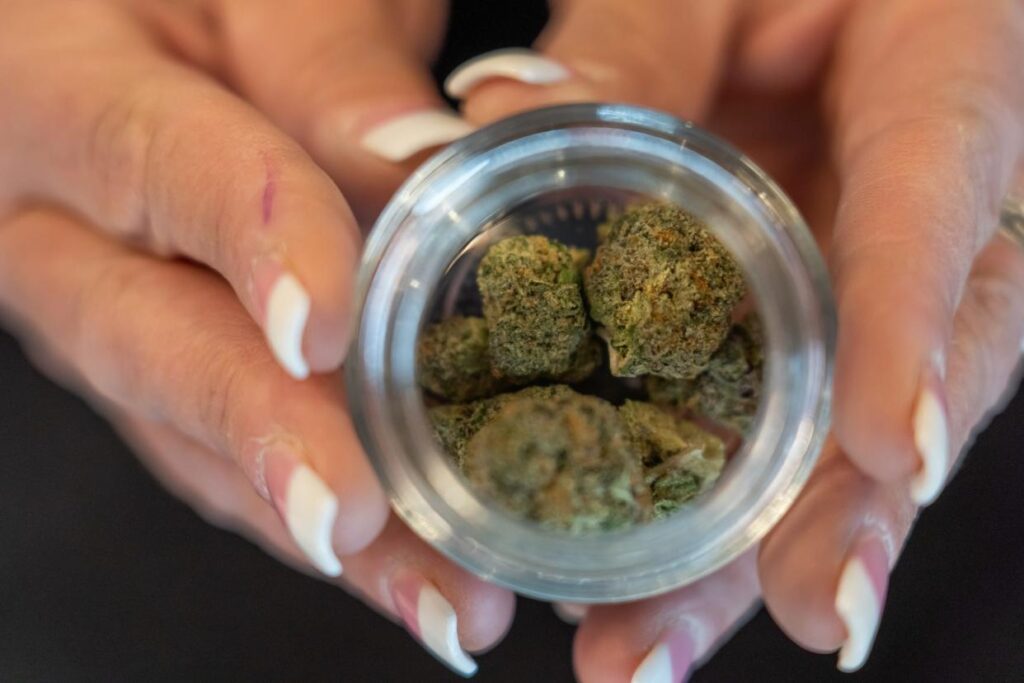Medical marijuana will become legal in Kentucky next year, but some provisions in place as part of the commonwealth’s upcoming program could make it difficult for cardholders to use it.
Under Kentucky’s new law, consuming the plant in its natural form through smoking and growing it at home could result in legal consequences or a loss of license if registered users try to light up instead of other means of using it, like vaping.
Matthew Bratcher, executive director of Kentucky NORML, an organization focused on reforming Kentucky cannabis legislation, said although dispensaries can sell raw plant material, consumption methods are limited unless in concentrated or vaporized forms.
“Flower is still available but smoking it is sort of against the rules, so I guess that constitutes rolling it up and firing it up like a cigarette or a joint,” he said.
According to the Kentucky Office of Medical Cannabis, consuming raw plant material through “combustion” — or smoking — is “strictly prohibited for medical cannabis cardholders under Kentucky law.” Violators could possibly have their medical marijuana license suspended or revoked and also be subject to any local laws or ordinances that apply, officials said in a statement to The Courier Journal.
Other violations under the new law include consuming vaporized products in public spaces, possessing more marijuana than the amount determined legal by the cabinet and cultivating marijuana at home, which could result in misdemeanor or felony charges, fines or jail time.
Why is Kentucky’s new medical marijuana law so restrictive?
Jason Nemes, Kentucky State Representative for the 33rd district, said the passing of Senate Bill 47 required multiple provisions and discussions.
“I do understand that some doctors think it’s the most effective way for some conditions, but with smoking in there, it wasn’t going to pass. There are very many people, including myself, we don’t want any smoking ever in public,” Nemes said. “With smoking in your home, we had to put the provision in the bill just to make sure we could get it passed.”
According to the University of Kentucky, the state currently ranks fourth for adult smoking rates, down a couple of spots after many years in first or second. In 2022, the average rate was 17.4%. It also remains the state with the largest number of tobacco farms.
Nemes said while Kentucky being known for its infamously high smoking rates “may have been in many people’s minds” when drafting the commonwealth’s provision against lighting up in the law for the program, it wasn’t the primary factor.
“Mostly, it was an effort to ensure that you can walk around our communities and not smell marijuana here,” he said.
Critics point to western states, potential federal rescheduling to advocate for more lax rules
Robert Matheny, director for the Kentucky Cannabis Freedom Coalition and owner of KY CBD FARMACY, said the combustion clause is another way to criminalize Kentuckians for a product they’ll legally be allowed to have.
“The legislators that wrote this bill had no intention of helping Kentucky gain access to this beneficial plant but to overregulate and create revenue from the backs of Kentuckians,” Matheny said.
Patrick Dunnagan, founder of the Kentucky Cannabis Freedom Coalition, said the commonwealth’s restrictions remain intense amidst possible change at the national level.
“We’ve got the DEA literally on the verge of rescheduling this to Schedule III,” Matheny said. “That’s in a nutshell saying that the federal government agrees it has … medicinal value.”
Some states, like Ohio and West Virginia, have enacted similar legislation in their medical marijuana programs, while those at the forefront of the marijuana movement like California, Colorado and Oregon have more lax provisions.
Bratcher said medical patients with certain conditions need access to the entirety of the plant, but in a state where smoking is frequent, he understands where legislators are coming from.
“There are also certain patients that need to choose a whole plant for the TCH A and TCH B, especially cancer patients,” Bratcher said. “Having access to the whole plant is super important and they realize that, but we’re a state that’s been trying to cut down on smoking of any form for a long time.”
H/T: www.yahoo.com



